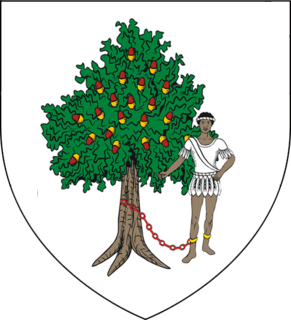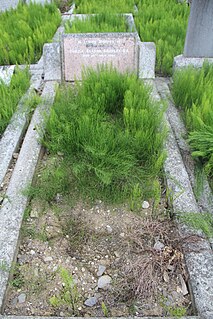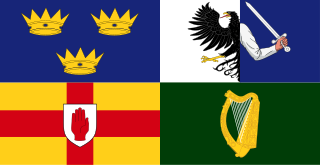
Peadar O'Donnell was one of the foremost radicals of 20th-century Ireland. O'Donnell became prominent as an Irish republican, socialist activist, politician and writer.
Séamus Ó Grianna was an Irish writer, who used the pen name Máire.
An Gúm was an Irish state company tasked with the publication of Irish literature, especially educational materials. The agency is now part of Foras na Gaeilge. Its mission statement is "To produce publications and resources in support of Irish-medium education and of the use of Irish in general." It is the largest publisher of books in Irish in the country. Seosamh Ó Murchú is the current Senior Editor.

An tUltach is the official magazine of Comhaltas Uladh, the Ulster branch of Conradh na Gaeilge.

Ranafast or Rinnafarset is a Gaeltacht village and townland in the Rosses region of northwest County Donegal, Ireland.

'Donnellan is an Irish surname and refers to the clan name Ó Domhnalláin or O'Donnellan.
Gluaiseacht Cearta Sibhialta na Gaeltachta or Coiste Cearta Síbialta na Gaeilge, was a pressure group campaigning for social, economic and cultural rights for native-speakers of Irish living in Gaeltacht areas. It was founded in Connemara in 1969 to highlight the decline of the Irish language and to campaign for greater rights for Irish speaking areas in the area of access to services, broadcasting and ultimately an elected assembly of their own. It was later named Gluaiseacht na Gaeltachta.
Joseph Patrick Murphy was a member of the Irish Republican Army who died on hunger strike at Cork Gaol in 1920 during the Irish War of Independence.
Seosamh Mac Grianna was an Irish writer. He was born into a family of poets and storytellers, which included his brothers Séamus Ó Grianna and Seán Bán Mac Grianna, in Ranafast, County Donegal, at a time of linguistic and cultural change. Mac Grianna is the most high-profile modern writer in Ulster Irish.
Joe Heaney was an Irish traditional singer from County Galway, Ireland. He spent most of his adult life abroad, living in England, Scotland and New York City, in the course of which he recorded hundreds of songs.
Seosamh Ó Cuaig is a native Irish language speaker and activist and member of Galway County Council from Connemara, County Galway. In 1969 he helped found Coiste Cearta Síbialta na Gaeilge, together with members of Sinn Féin. He is a member of Údarás na Gaeltachta, having served from 1989 to 1994, and re-elected in 1999. He works as a journalist and broadcaster with RTÉ Raidió na Gaeltachta He has been involved in the production of a number of documentaries in Irish for film and television. Often described as an Independent Republican Socialist, he helped organise the James Connolly Forum in Galway.
Domnallan mac Maelbrigdi, Irish dynast, fl. c. 9th/10th century.
Mael Sechlainn Ó Domhnalláin, Irish poet, died 1375.

Feasta is an Irish-language magazine that was established in 1948. Its purpose is the furtherance of the aims of Conradh na Gaeilge, an objective reflecting the cultural nationalism of the language movement, and the promotion of new writing. Feasta describes itself as a review of Irish thought, literature, politics, and science. Until recently it was supported financially by Foras na Gaeilge, but this support was withdrawn because of a review of funding priorities. At present the magazine relies on its own resources.
Joe Clarke was an Irish republican activist.
Liam Mac Con Iomaire is an Irish writer, journalist and broadcaster. He has been a newsreader on RTÉ. He is the author of a number of books and some translations, mainly concerning Connemara, and biographies of Breandán Ó hEithir and Seosamh Ó hÉanaí.
Inniú was an Irish-language newspaper, published in Dublin, Ireland, from 17 March 1943 until 24 August 1984 when it was merged with the Galway-based publication Amárach to form a new weekly newspaper Anois, which started in September 1984.

Seosamh Laoide, known as "Mac Tíre na Páirce", was an Irish language scholar and activist during the period 1893 – 1915. Today he is perhaps best remembered for his work on Irish placenames, particularly on the placenames of Dublin which often became the established Irish versions on the city's streets following the establishment of the Irish state in December 1922.
James Joseph (Seamus) Hughes was an Irish trade unionist, revolutionary, composer, and public servant.
JK Bracken was a local politician, Fenian and founder of the Gaelic Athletic Association.










